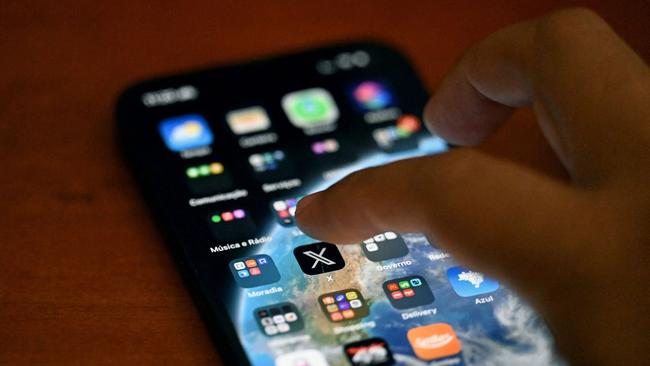Why we’re failing our kids on social media literacy

It’s a meme that springs to mind this week as NSW Premier Chris Minns and South Australia Premier Peter Malinauskas host Social Media Summits in Sydney and Adelaide.
Hundreds of experts and academics, doctors and government officials will gather and opine on the irrefutable fact that social media has rewired our kids’ brains – and not necessarily for the better.
But for every expert calling for a social media ban for kids you can be sure there will be another one arguing that denying our kids access to social media is tantamount to child abuse – closing them off to online communities vital to their mental wellbeing.
And while our politicians should be applauded for finally tackling a problem parents all over the country have been grappling with for years, it’s hard not to worry the key measures being floated to control kids’ exposure to mis- and disinformation – including social media bans for under 16s and age-assurance technologies – have as much chance of succeeding as the Footloose dance ban.
I spend a lot of time in primary school classrooms, teaching media literacy to kids aged 8 to 12 years-old and talking to teachers. And I can tell you smartphone ownership among pre-teens is bordering on universal, and they are all regularly on social media platforms.
And here’s the thing: they’re increasingly on platforms that most adults have never heard of.
Yes, TikTok and Snapchat are huge with kids – but how many of you have heard of Twitch or Discord or Whisper? How many of you are aware of the extent to which kids’ online games like Roblox have become the proxy social media apps for the next generation?
My concern is that for every platform we ban, three others will pop up to replace them. And they likely won’t be on parts of the internet we’re able to regulate. After all kids finding a space to congregate without the supervision of adults is a tale as old as time. The only difference now is that the congregating is being done virtually.
There’s also the not insignificant fact that while many have tried, no jurisdiction in the world has yet managed to crack the age-verification nut – with a nod to the UK, Germany and France who have all tried and failed, and a special mention to Louisiana and Utah in the United States where, when age-restriction technologies were brought in, there was an almost 1000 per cent and threefold increase respectively in the use of Virtual Private Network technology to bypass the restrictions.
Australia may well find a way that works when it comes to age-verification. And as a father of two teens, I sincerely hope it does. But how long will it take? And what do we do in the meantime?
We educate, that’s what we do. In the same way we undertook a national effort to inoculate ourselves against Covid, we take steps now to arm our kids with the critical thinking tools they need to tell online fact from fiction.
After all, we don’t send our kids to the beach by themselves without first teaching them how to swim. We don’t send them to the corner shop without first making sure they understand the basics of road safety. Why are we letting them loose on the internet without first teaching them how to spot mis- and disinformation?
And in just the same way we teach our kids water and road safety at an early age, media literacy absolutely needs to be taught to our kids in primary school – before they get a smartphone in their hands and disappear into the social media vortex.
It’s why we created Newshounds – Australia’s first, free media literacy classroom resource for primary school kids – teaching them to recognise misinformation when they came across it online.
When we launched it just over a year ago, it was with what we thought would be the ambitious goal of having 500 classrooms signed up within a year. As of this week, 3,345 Australian primary school teachers had signed up to make critical media consumers of their students.
Why?
Because primary school teachers are at the coal face. They see, perhaps better than any parent, the extent to which our kids are on social media – how pernicious misinformation is, and how ill-equipped our kids are to deal with it.
In Newshounds, a cartoon detective dog called Squiz-E teaches kids to ‘Stop, Think and Check’ before believing everything they see online.
And thanks to a Queensland University of Technology-commissioned report, we know that kids who are taught Newshounds at school take the lessons learned back to their households – often challenging their parents at the dinner table when talk turns to ‘facts’ they’ve picked up on their Facebook feeds.
We have a massive deficit here in Australia, and indeed around the world, between the amount of information our kids are exposed to each day and their ability to consume it with a discerning eye. And it’s a problem growing bigger by the day.
So yes, let’s use these summits to explore whether an outright ban or age-verification technologies could work, but in the meantime, let’s control the controllables and institute a national media literacy education strategy.
Let’s try to give shape to the world that actually is, not to the one we’d like it to be.
Bryce Corbett is a journalist, author and the creator of Newshounds.



There’s a scene from the iconic 80s movie Footloose that pops up every now and then on TikTok. It’s a meme of actor John Lithgow – the fire-and-brimstone preacher dad in the movie – declaring a dance ban in the small country town over which ministers. Rock and roll, he declares, will be the death of them.